Twenty-First Century Bimonthly, Issue 179 (2020 June), Research Centre for Contemporary Chinese Culture
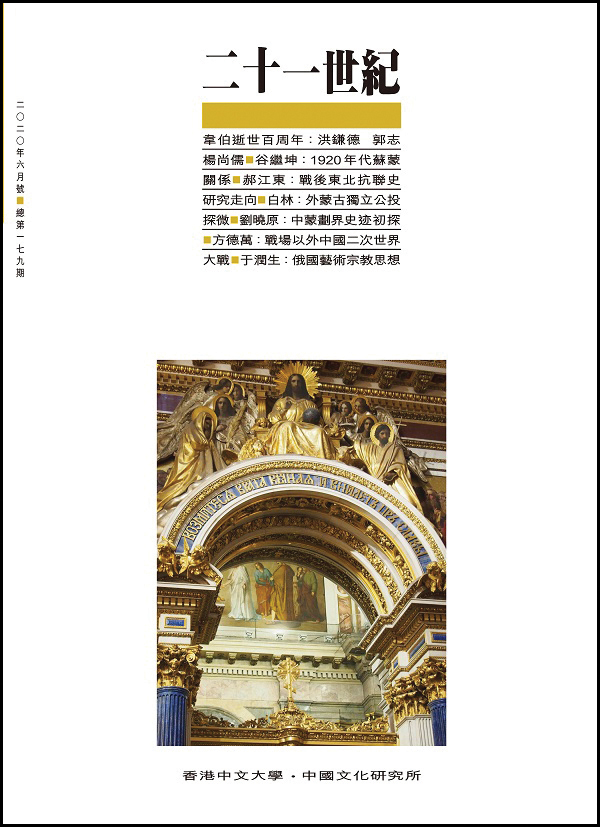
The topic of The Twenty-First Century Review is The 100th Anniversary of Max Weber’s Death. Max Weber (1864–1920) was the founder of modern sociology. Three scholars were invited to pay tribute to this master by reflecting on the contemporary significance of Weber's theory.
“A Preliminary Analysis of Max Weber’s Conception of the State” by Liente Hung
“The Lessons of Max Weber’s Elite Democracy Theory to Contemporary China” by Yang Shang-ju
“Reflections on the Contemporary Implications of Max Weber’s The Protestant Ethic and the Spirit of Capitalism” by Kwok Chi
The four academic papers in this issue are all important research results on the relationship between China and neighbouring countries.
“Soviet-Mongolian Relations in the Late 1920s: The ‘Ryskulov Incident’” by Gu Ji-kun
“The Product of the Great Power’s Competition: A Preliminary Study of the 1945 Mongolian Independence Referendum” by Bai Lin
“The Sino-Mongolian Border Demarcation (Part I): A Contest among ‘Comrades and Brothers’” by Liu Xiao-yuan
“The Characteristics and Trend of the Research on the History of Northeast Anti-Japanese United Army after the Second Sino-Japanese War” by Hao Jiang-dong
This year marks the 75th anniversary of China’s victory in the Second Sino-Japanese War. A newly written research paper, “Wartime Everydayness: Beyond the Battlefield in China’s Second World War” by Hans van de Ven, appears in the Research Notes column.
Twenty-First Century Bimonthly, Issue 180 (2020 August), Research Centre for Contemporary Chinese Culture
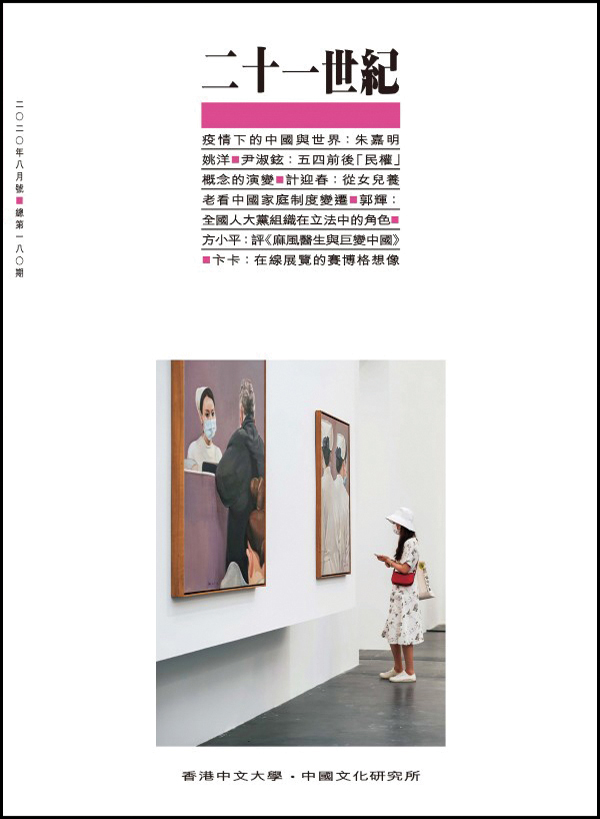
As the world is plagued by the COVID-19 virus, the Twenty-First Century Review of this issue focuses on “China and the World in the Pandemic Era”.
The two essays reveal the impact of the pandemic on the political and economic structures as well as different levels of the society.
“‘Desinification’ and China’s Responses” by Yao Yang
“How Will COVID-19 Change the Idea and Structure of Social Cost” by Zhu Jia-ming
The four academic papers in this issue can be described as having both academic and practical significances.
“The Dual Variation of Human Right and Democracy: Transformation of the Concept of ‘Minquan’ during the May Fourth Period” by Yin Shu-xuan
“The Sino-Mongolian Border Demarcation (Part II): From Brothers to Neighbours” by Liu Xiao-yuan
“‘Mosaic Familism’: Daughters Providing for Parents and the Reinstitutionalization of Chinese Family” by Ji Ying-chun
“Dual Legislator: The Role of the Party Organizations of the National People’s Congress in Legislation” by Guo Hui
A book review related to the pandemic is also published.
“The Original Work in the Study of the History of Epidemic Prevention in Contemporary China: A Review on Liu Shaohua’s Leprosy Doctors in China’s Post-Imperial Experimentation: Metaphors of a Disease and Its Control” by Fang Xiao-ping
Studies in Chinese Linguistics (Volume 41, Number 1), T.T. Ng Chinese Language Research Centre
_cover.jpg)
Studies in Chinese Linguistics (Volume 41, Number 1) has been released. There are three articles in this issue:
- Ting-Chi Wei: The Structure of Split Questions in Mandarin Chinese
- 2. Changsong Wang and Mingming Zheng: A Morphosyntactic Analysis of Patient-Subject Constructions in Chinese
- Zhu Xie: Two Types of Verb Reduplications in Mandarin Chinese
This is an open-access journal distributed by Sciendo (formerly known as De Gruyter Open). PDF copies of these articles can be downloaded freely via http://www.cuhk.edu.hk/ics/clrc/.
Current Research in Chinese Linguistics (Volume 99, Number 1), T.T. Ng Chinese Language Research Centre
_cover.jpg)
Current Research in Chinese Linguistics (Volume 99, Number 1: Special Issue on “The 22nd International Conference on Yue Dialects”) was released. There are 11 articles in this issue. PDF copies of these articles can be downloaded freely via http://www.cuhk.edu.hk/ics/clrc/.
Keynote Speeches
May Bo Ching, “‘West End Speech’: The Sound of Urbanity of Canton and Hong
Kong That Expanded to Shanghai” (in Chinese)
Benjamin K. Tsou, “From ‘Ding1Dong1’ to ‘Ding4Ling1Dong4Long4’: Reflections on
Yue – Cantonese Quadra-syllabic Expressions”
Parallel Sessions
Giorgio (Georg) Orlandi, “The Reconstruction of Proto-Yue Vowel System: An
Improvement of Huang’s System (2009)”
R. Y. H. Sham, “Innovations on Fenyun Cuoyao: Textual History and Phonological
Reconstruction” (in Chinese)
Ling Yann Wong, “Analysis of the Pronunciations, Formative Methods of Phrases
and Syntax of Medical Communicative Language in the Canton Dialect Noted by
John Glasgow Kerr” (in Chinese)
Chaak-Ming Lau and Sze-Wing Tang, “The Special Pronunciation for the Character
“Waan1” in Hong Kong Place Names” (in Chinese)
Hsiufang Yang, “The Diversity and Multilayered-ness of Derivational Morphology
in Cantonese” (in Chinese)
Tommy Tsz-Ming Lee, “Defending the Notion of Defocus in Cantonese”
Ka-Fai Yip, “Three Discontinuous Constructions of Cantonese Verbal Suffix Can”
(in Chinese)
Xing Fang, “Is Cantonese Less Useful Than English? An Investigation of Language
Attitudes in the Guangdong Province of China” (in Chinese)
Masayuki Yoshikawa, “Hong Kong Cantonese and Taiwanese Southern Min Written
Language Trends Since the Mid-1990s” (in Chinese)
Renditions, No. 93 (Spring 2020), Research Centre for Translation
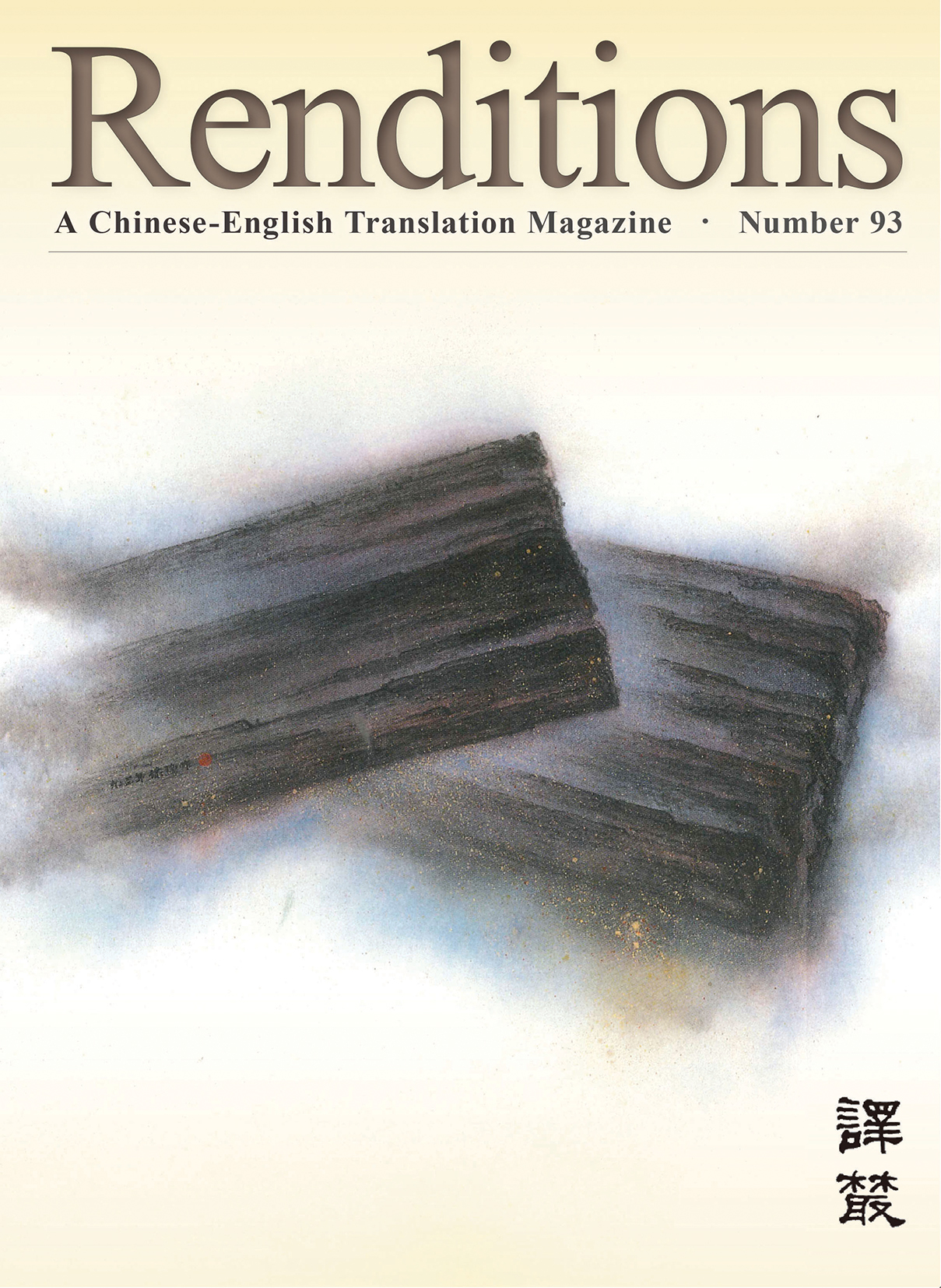
Renditions no. 93 features an eclectic mix of works by important figures in Chinese literary and cultural history or by contemporary prize-winning authors. Highlights include portions of Wang Tao’s 王韜 diaries that record his journey to Hangzhou in 1858, and Ge Fei’s 格非 fiction ‘Oyster Shells’ 蚌殼, an imaginative tour de force that unfolds considerably psychological complexity
Li Shangyin The Brocade Zither. Translated by Xiang Liu
Ma Zhiyuan Autumn Thoughts, to the Tune of ‘Sky Pure Sand’. Translated by Xiang Liu
Wang Tao Wang Tao’s Diary: excerpts. Translated by Sebastian Eicher
Lin Shu Reading the Biographies of Exemplary Women. Translated by César Guarde-Paz
Lu Xun On Moustaches. Translated by Peter Witherington
Kang Youwei Lectures on the Heavens: Chapter Eleven, Treatise on God. Translated by Zhaoyuan Wan and Patrick Swire
Liang Yuchun About Vagabonds. Translated by Lifeng Ouyang
Ge Fei Oyster Shells. Translated by Andrew F. Jones
Xie Hong A Romance. Translated by Jicheng Sun and Hal Swindall
Zhang Wei The Story of Ah Yah. Translated by Dongwei Chu
Yuan Changming Ten Poems. Translated by the poet
Hong Kong Impressions, Art Museum

This exhibition catalogue features 92 paintings and 40 photographs of Hong Kong sceneries from the 1940s to 1970s from the collection of the Art Museum, CUHK. It includes essays by Dr. Pedith Pui Chan and Dr. Vivian Ting Wing Yan, as well as entries written by Dr. Pedith Pui Chan, Dr. Vivian Ting Wing Yan, Prof. Josh Yiu and Dr. Phil Chan. This bilingual catalogue also comes with full-colour plates and the transcription of all inscriptions, colophons and seals of exhibited paintings.
Pedith Pui Chan, “Hong Kong Impressions: Modern Tourism and the Visual Representations of the Hong Kong Landscape”
Vivian Ting Wing Yan, “Victoria Peak: Seeing and Imagination”
Plates & Catalogue
Hong Kong Island
Kowloon
The New Territories
Hong Kong Impressions: Photographs by Two American Officers in the 1950s
Select Scenic Places in Hong Kong Visited by Artists
Artist Biographies
Studies in Translation History 2018, Research Centre for Translation
By Wong Wang Chi, Lawrence
Chinese Version Only
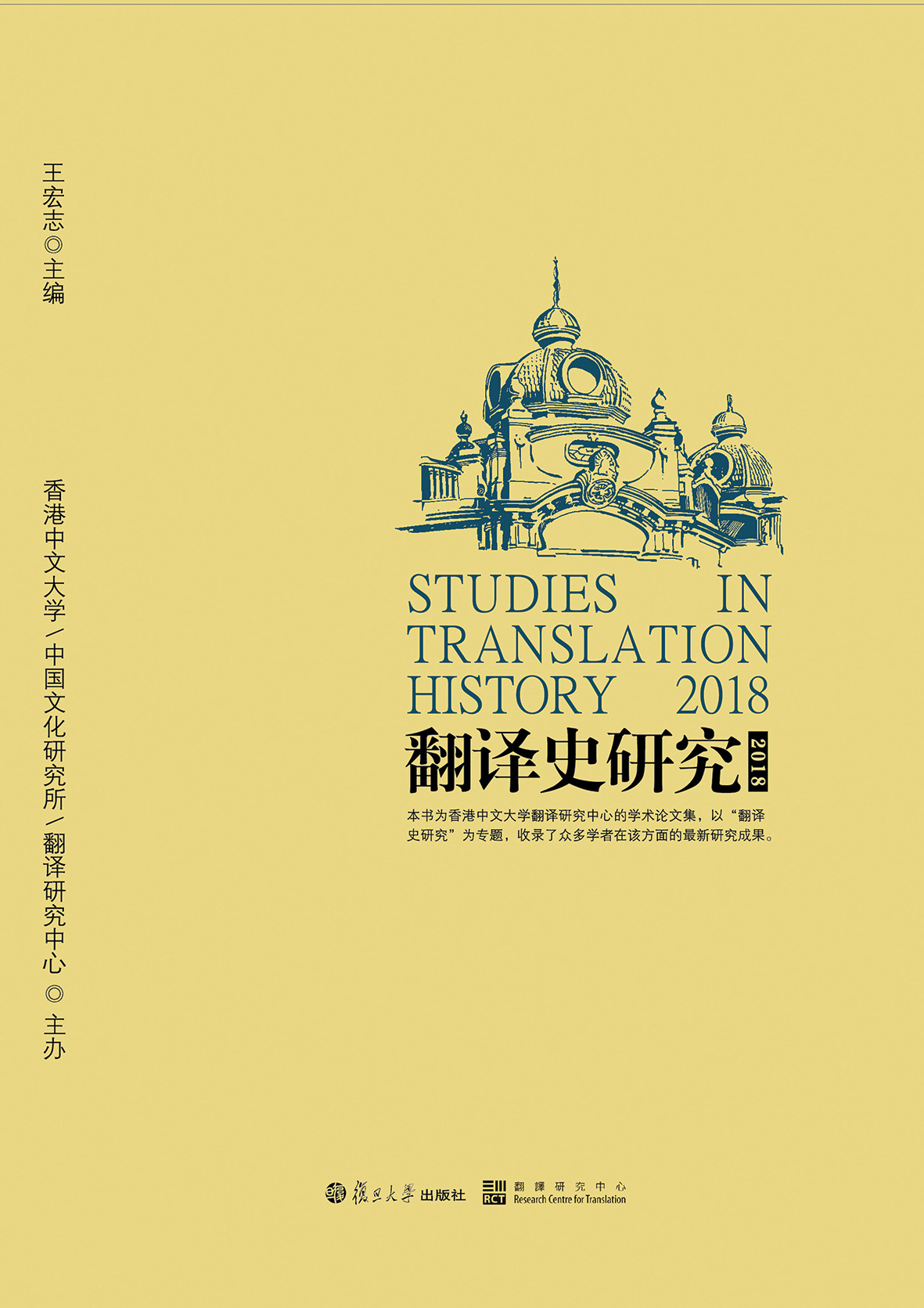
My City: a hongkong story (2020 reprint), Research Centre for Translation
By Xi Xi
Translated by Eva Hung
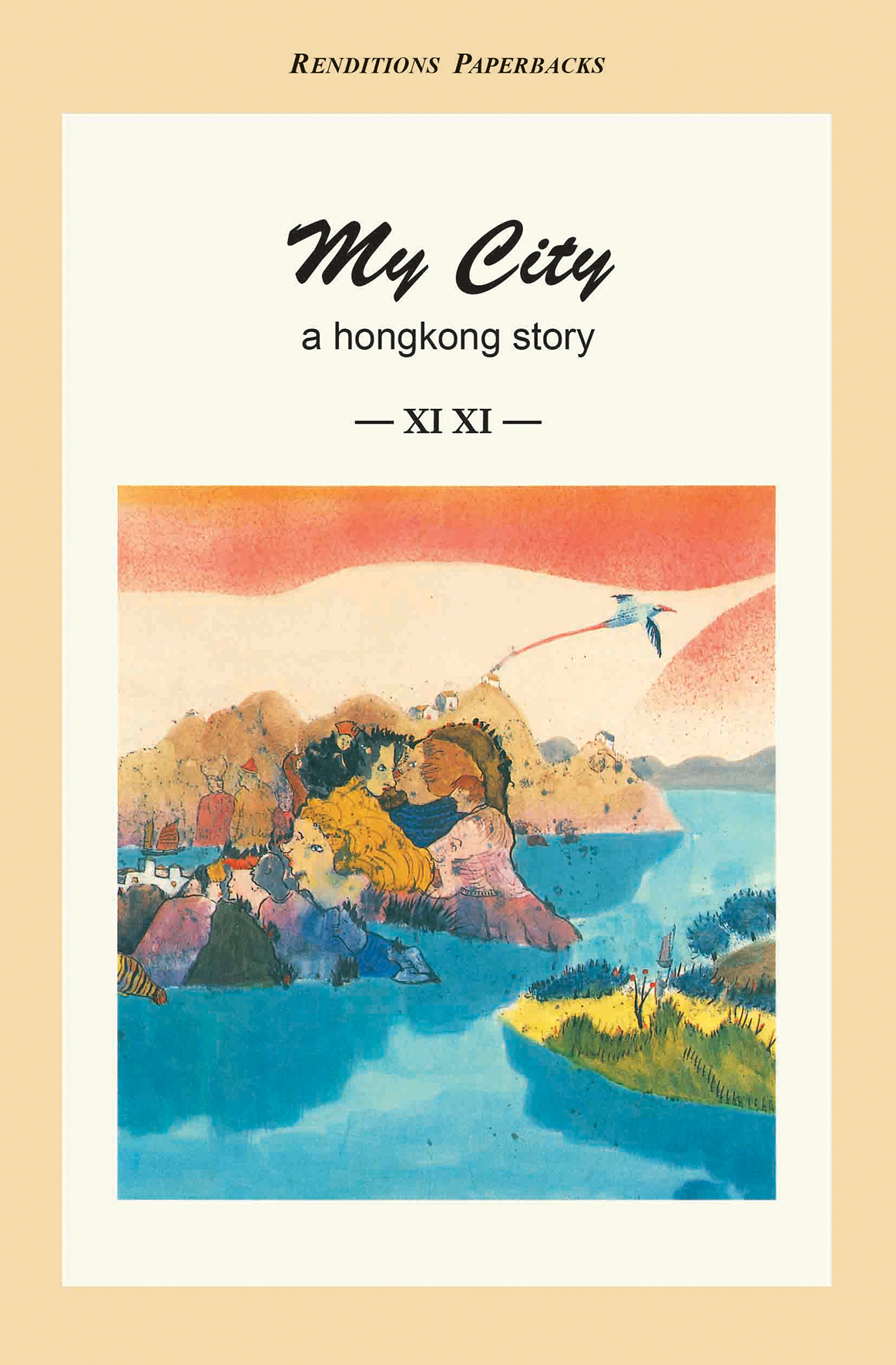
Xi Xi 西西 _is Hong Kong’s foremost woman writer, and My City: a hongkong story 我城 is one of her best novels. Written in the 1970s, My City presents life in this vibrant city through the eyes of its young protagonists, onto whom the author has projected various facets of her personality and vision. The novel is also notable for Xi Xi’s experimentation with the Chinese language: she creates a deceptively childlike narrative—rare in Chinese fiction—which allows her to weave a variety of linguistic registers into a fresh tapestry rich in local colour. Seldom has a writer captured the spirit of a generation with such apparent simplicity and ease.
Xi Xi, pen-name of Zhang Yan 張彥, was born in Shanghai in 1938 and came to Hong Kong with her family in 1950. She was first a primary school teacher before starting to write full-time in the mid–1980s. A prolific writer covering a variety of genres, she is equally at home in poetry, fiction, the occasional essay, translation, film review, and art criticism.
Eva Hung, the translator, was born and educated in Hong Kong. She received her B.A. and M.Phil. degrees in translation from the University of Hong Kong and her Ph.D. from the University of London.
This translation is first published in 1993 and reprinted in 2020. |














_cover.jpg)
_cover.jpg)




